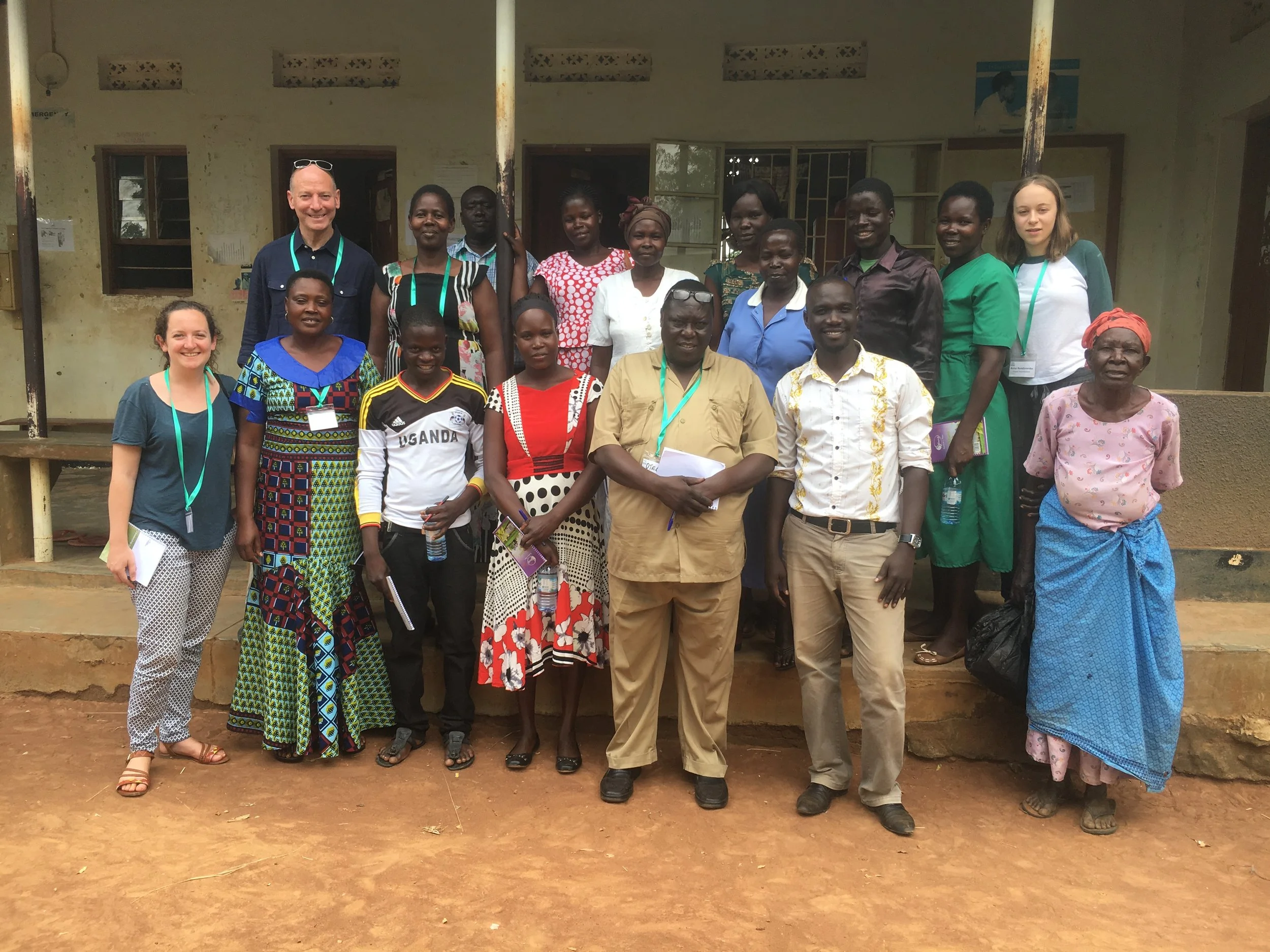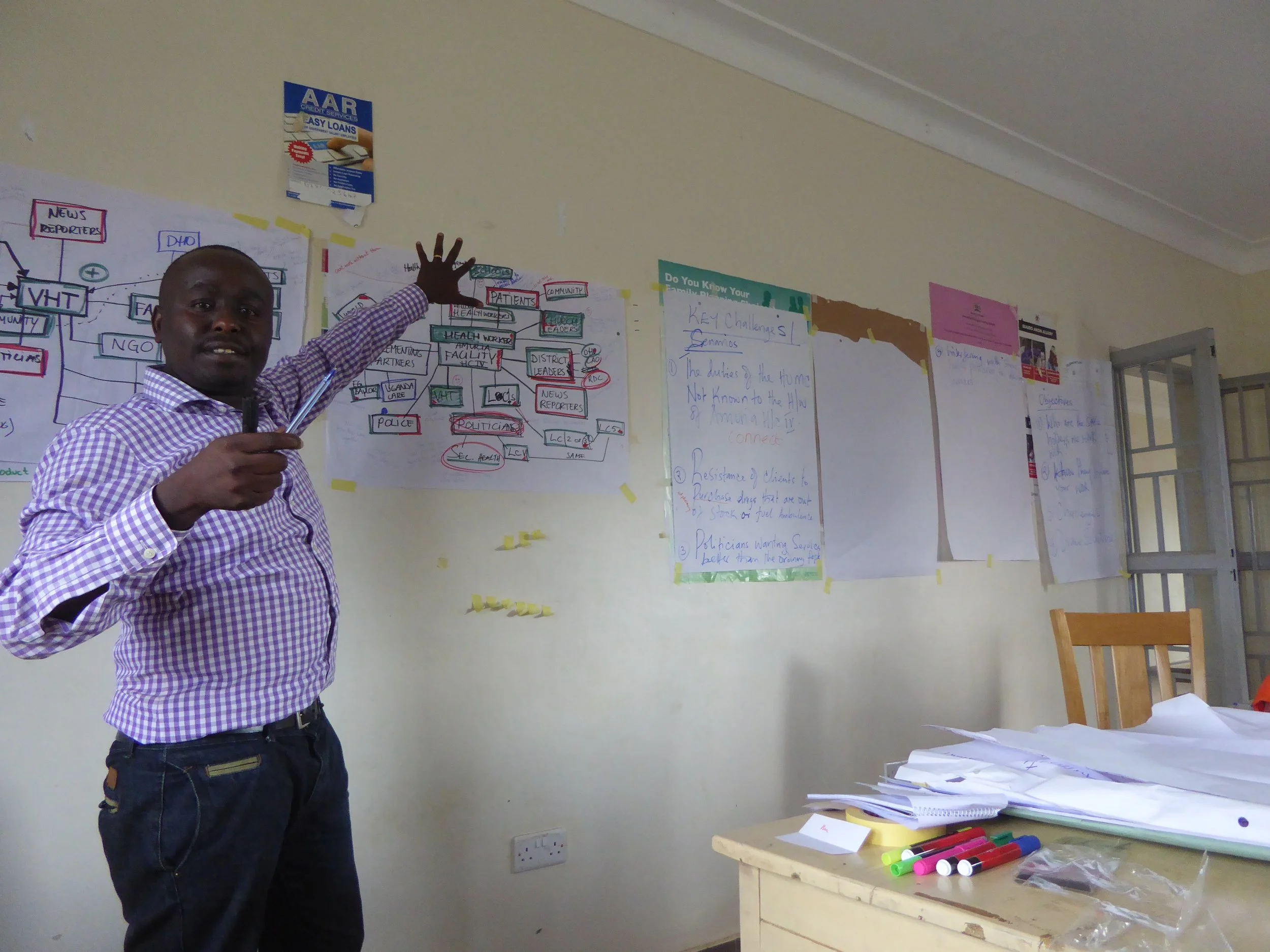Pepal is currently working in Uganda, Tanzania and Myanmar to facilitate a number of partnerships focused on issues spanning health systems strengthening, cervical cancer and HIV/AIDS.
Caring Together
a new approach for better health
Project partners:
Baylor-Uganda;
janssen pharmaceutica (johnson & johnson); COMIC RELIEF
Where:
Rwenzori and Eastern regions, Uganda
When:
january 2015 – MARCH 2018
Why:
In the Ugandan health care sector, it is widely recognised that poor leadership and a lack of effective teamwork contributes to poor service delivery and a demotivated workforce. However, few frontline health workers delivering services in the 112 districts of Uganda have been trained and supported in their role as leaders.
HOW:
Caring Together is an innovative approach to improving health worker performance, leading to better service delivery and more satisfied patients.
Developed by Baylor-Uganda, with the support of Pepal and Janssen Pharmaceutica, Caring Together is being tested and refined over three years in 270 health facilities in Uganda.
Caring Together trains health workers as mentors, empowering them to deliver communication, teamwork and time management training at their allocated health facilities. They establish long-term mentorship relationships with mentees centred on action plans for improvements staff can make in their own facilities. The project also aims to improve the use of performance management within the health facilities and wider districts.
By increasing staff motivation and equipping them with skills and methods to address service delivery challenges, this has increased motivation and functionality of health facilities. Consequently, patients receive a better service and are more likely to return for further care, improving health outcomes.
Our impact:
Since Jan 2015, Caring Together has trained 84 district mentors, reaching:
2 regions, 270 health facilities, 3,974 health workers and 2,410 VHT (village health team) members, serving a general population of 2,800,408.
In the first six months Caring Together has achieved some exciting early results:
• 34% reduction in staff lateness
• 29% improvement in meeting reporting deadlines
• 29% increase in the number of pregnant women wanting to return for services
“After the training, I realised that even the way I communicated helped me to motivate my staff”
NJIA Leadership Development Programme
Combating cervical cancer in Tanzania
Project partners:
Roche;
Management and Development for Health (MDH);
McBride and Lucius
Where:
Kagera region, Tanzania
When:
September 2015 – SEPTEMBER 2020
Why:
Tanzania has the highest reported number of cervical cancer cases in Eastern Africa. It is a leading cause of death among women in Tanzania, with 4,200 women dying of cervical cancer annually.
HOW:
Pepal leads in the coordination of this multi-stakeholder and multi-national partnership. NJIA brings together senior leaders from Roche, an international pharmaceutical company, and the Tanzanian health sector, developing their leadership capacities and ability to drive innovation in the face of situational and resource constraints.
The programme consists of two distinct components:
1) Leadership development: training component comprised of intensive workshops delivered by leading US-based learning and development consultancy McBride and Lucius.
2) Social impact: through our partnership with Tanzanian NGOs, project ideas generated during the leadership development workshops are developed and delivered to contribute to the fight against cervical cancer in Tanzania.
“The Tanzanian leaders were role models and mentors and the commitment of the healthcare workers that we interacted with gives me hope that there is an opportunity for change. I am optimistic that NJIA will have an impact on the women and families living in the Kagera region of Tanzania”
Innovation in Myanmar
Improving HIV care in Myanmar
Project partners:
multinational company; International HIV/AIDS Alliance IN MYANMAR
Where:
Yangon region, Myanmar
When:
January 2016 – DECEMBER 2017
Images courtesy of International HIV/AIDS Alliance
Why:
Myanmar has one of the highest HIV/AIDS, tuberculosis and Hep C rates in Asia. Due to high levels of stigma, socioeconomic inequality and social isolation, this particularly affects vulnerable and hard-to-reach populations such as injecting drug users and sex workers.
Only one third of an estimated 210,000 people living with HIV in Myanmar have access to life saving antiretroviral therapy and an estimated 15,000 people died of AIDS-related illnesses in Myanmar in 2013. Today, the Government of Myanmar is committed to providing HIV treatment to those that need it. However, the challenges it faces are enormous; these include a fragmented healthcare infrastructure, a conservative society that stigmatises those living with HIV, and difficulties in reaching affected populations, often located in remote rural areas. Many people living with HIV are also co-infected with TB and Hep C, creating an additional public health challenge.
HOW:
The Initiative comprises a series of four executive innovation programs that will take place in Myanmar. Each module will partner corporate managers with local Burmese NGO, government and healthcare practitioners to form joint teams that will work together to develop an innovative healthcare solution which leverages Myanmar’s extensive network of small private sector health care providers, and helps the country to reach its HIV treatment targets. Between modules, participants will continue to work together remotely to progress their ideas.
“Our vision is to develop a ‘blue print’ for delivering quality, cost-effective and affordable services to those affected by HIV, Hep C and TB, a model which can be scaled across Myanmar and the region.”






















